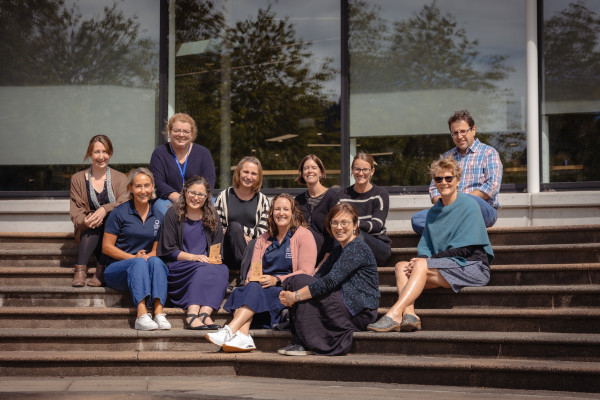- Tūhono home Hoki ki Tūhono
-
- Staff Directory
- Chief Executive Office Auckland International Office Corporate Services Finance Campus Services Functions and Catering Information Systems and Support Marketing, Communications and Engagement Learner Journey Academic Registry International Learner Services Te Punaka Ōwheo
- Learner Experience Academic Excellence Central Campus College of Community Development and Personal Wellbeing College of Engineering, Construction and Living Sciences College of Health College of Work Based Learning Open Education Resource/OERu Research and Postgraduate Studies Te Maru Pumanawa | College of Creative Practice and Enterprise
- Māori Development and Kaitohutohu Office People, Culture & Safety People and Culture Childcare Centre Te Ama Ako | Learning and Teaching Development Wellbeing and Safety Auckland Staff Directory Executive Office Academic Corporate Services Marketing and Business Development Human Resources Campus Quality and Programme Development
-
 Our people make a better world
Our people make a better world
We build the capabilities of individuals, organisations and communities and help them to realise their potential.
Staff Directory
-
- Tools
- Academic Integrity Declaration Form AIC applications dashboard Approved programmes Approved programme fees Centralised assessement repository Chemwatch Course evaluation and surveys CRM applications CRM customer service hub Delegations policy/process Disability and neurodiversity Dynamics 365 (CRM) EBS Ontrack EBS Report Email security personal portal Employment Matters / Solarworkplace / Performance reviews eTaxi eTV
- Financial variance reporting Hidden Disabilities Sunflower programme FCM travel intranet InPlace International entry requirements Knowledgebase articles Learner support dashboards Linkedin Learning Log a job with Marketing Login as an applicant Media consent form Microsoft 365 Moderation App Moodle OP Docs OP Docs - Publishing OP Image Libraries Performance Excellence Portal Product Evaluation Panel
- Policy Library Privacy Programme and course design/development Qualtrics XM RDS Remote access support portal Research Database Robertson Library Staff FAQs about graduation Status of Programmes Student intranet (Kāpehu) Study Abroad info for learners Taha Talks (videos for students) Tūhauora I Wellbeing resources Uniprint Vault Webexpenses Auckland tools
-
 Vault
Had an accident or near miss?
Log it here
Vault
Had an accident or near miss?
Log it here
-
- Communities
- Community AI Steering Committee Ally Network EBS Community of Interest EdTech Champions Health & Wellbeing Research Internal Evaluation Neurodiversity Professional Team Professoriate Proud@OP Student Support Website Advisory Group Web Champions Working under the Rainbow Project Learner Capability Trade Training Centre
- Committee Academic Committee Animals@OP Diversity and Equity Doctor of Professional Practice Committee Kaunihera Whakahaere - Leadership Council Internal Evaluation Learning & Teaching Leadership Team Library Committee Mental Health and Wellbeing Advisory Group Otago Polytechnic Board of Directors Pastoral Care Code Committee Programme Approvals Committee Research and Postgraduate Committee Research Ethics Committee Staff Subcommittee
- Think Tanks Mātauraka Our learners achieve educational success Pūtea Our financial success Tākata Our people, our team, our community Tiriti Our active commitment as a Treaty partner Tūroa Our commitment to be a sustainable and responsive organisation
-
 Create a community
Create a community
Do you have a community, committee or project that you'd like represented here?
Communities
-
- About OP
- Keep up to date All news All events All notices All blogs Share your info Create a news article Create an event Create a notice Create a blog
- Community and Partnerships Alumni and friends Education Foundation Operational information Academic calendar 2025 Academic calendar 2026 Current vacancies Dunedin campus map Our policies Topical FAQs
- Who we are About OP Commemorative sites Māori Strategic Framework OP merchandise Our history Our strategic priorities Pasifika Strategic Framework (2025-2030) Vision and Values Working for us OP job opportunities Wellbeing Calendar Working at OP
-
New Zealand: 0800 762 786
contact us
International: +64 3 477 3014
Adult perspectives and experiences using multifunction power wheelchairs in Aotearoa, New Zealand
Author: Maria Whitcombe-Shingler
Supervisors: Sian Griffiths Merrolee Penman
Adult perspectives and experiences using multifunction power wheelchairs in Aotearoa, New Zealand
Maria Whitcombe-Shingler
8 March 2013
Abstract
This study explored the perspectives and experiences of adults using multifunction power wheelchairs in Aotearoa, New Zealand. A multifunction power chair in the context of this research is defined as a power wheelchair which has two or more of the following power functions: tilt in space; seat elevate; recline; stand and power elevating leg rests.
A qualitative descriptive methodology using in-depth, individual semi structured interviews was conducted with a convenience sample of ten wheelchair users from New Zealand. The main themes identified were: mobility, environmental factors, independence/ ‘well-doing’, personal and social identity and ‘well-living’. The findings gave rich detailed descriptions of some of the benefits and challenges for a group of multifunction power wheelchair users.
The benefits identified included increased mobility and independence. Improved personal identity and communication through the use of an elevated seat or standing position which achieved inclusion and face to face communication. Greater social participation and function i.e. ‘well-doing’ achieved a state of ‘well-living’, defined as self-determined, satisfactory living.
Challenges related to environmental access, repairability, and the increased weight of the wheelchairs which resulted in transportation problems. Whilst the wheelchairs enabled increased autonomy and independence, this in turn led to a series of different issues, such as the need for person centred outcomes, practice knowledge, broader funding criteria, and backup support, which should be considered during the process from wheelchair assessment to provision and beyond. ‘Well-living’ can be achieved when mobility, function, and environmental factors are addressed to the user’s satisfaction.
Keywords: multifunction power wheelchairs, well-living, independence, personal identity, well-doing, environment
Maria Whitcombe-Shingler's research was supervised by Sian Griffiths and Merrolee Penman.
Licence
This thesis is available under a Creative Commons Attribution-NonCommercial-NoDerivatives licence CC BY-NC-ND 4.0.
